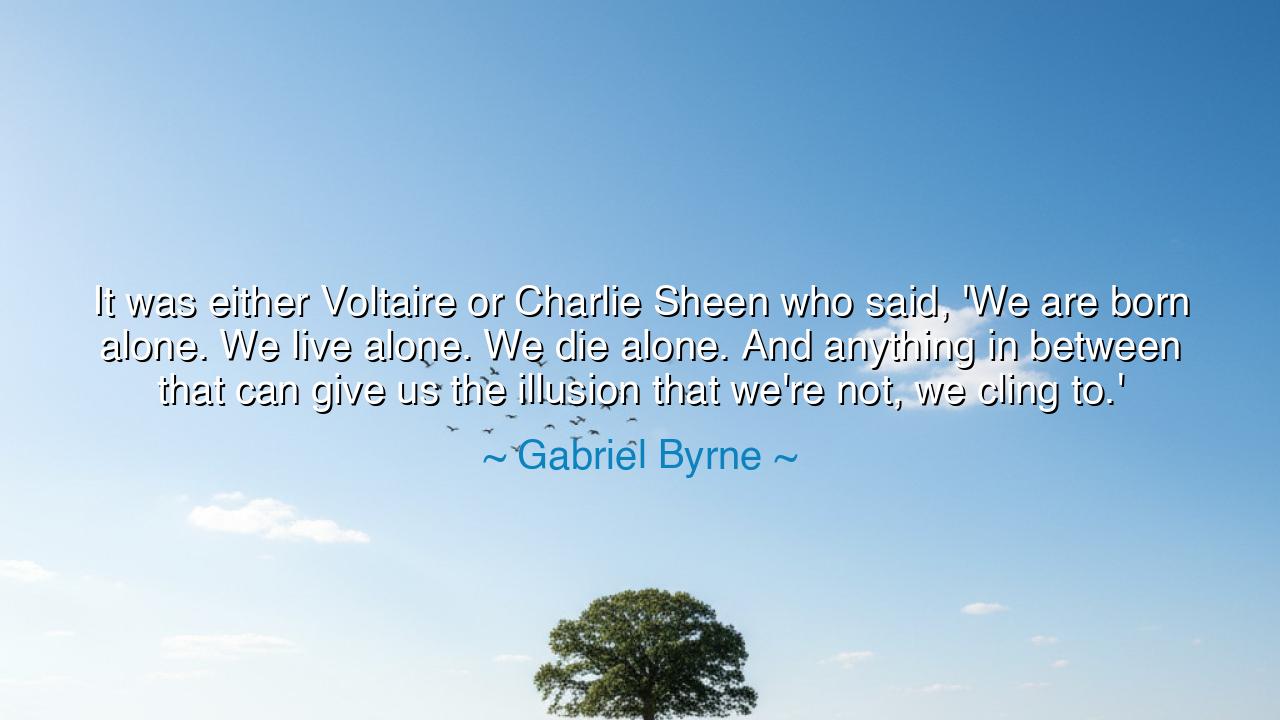
It was either Voltaire or Charlie Sheen who said, 'We are born
It was either Voltaire or Charlie Sheen who said, 'We are born alone. We live alone. We die alone. And anything in between that can give us the illusion that we're not, we cling to.'






“It was either Voltaire or Charlie Sheen who said, ‘We are born alone. We live alone. We die alone. And anything in between that can give us the illusion that we’re not, we cling to.’” — Thus spoke Gabriel Byrne, the Irish actor and philosopher of spirit, weaving wit with truth. His words — at once somber and luminous — reflect the ancient paradox of the human condition: that though we walk surrounded by others, the journey of the soul is, in its essence, solitary. The humor in his remark softens the gravity of the thought, yet beneath the jest lies a truth as deep as time — that solitude is our beginning, our burden, and perhaps, our liberation.
The origin of this quote is layered, for Byrne himself, known for his introspective soul, attributes it half in jest to Voltaire, the philosopher of reason, and half to Charlie Sheen, the emblem of modern excess. In that duality, there is meaning — the blending of wisdom and absurdity, the eternal dance between the thinker and the fool. Byrne’s reflection comes from a place of experience: the stage and screen may have given him fame and applause, yet he understood that neither adoration nor company can dissolve the quiet isolation that dwells at the core of being. For in the silence of night, when all the noise fades, every soul must face itself alone.
To say we are born alone is to speak a universal truth. The child enters the world in solitude, separated from the mother by the first breath — a cry of independence and fear. And though we may spend our days seeking connection, building families, forging friendships, and falling into love, a part of us always remains unreachable. Even in the arms of another, there is an inner chamber no one can enter — the sanctuary of thought, the shadow of memory, the weight of private sorrow. It is this solitary center that defines our humanity. The wise do not fear it; they seek to understand it.
Yet Byrne reminds us that though we are destined to solitude, we are also driven to cling — to friendship, to love, to community. These are the illusions, or perhaps the mercies, that make life bearable. The ancients themselves understood this tension. Marcus Aurelius, emperor and Stoic, wrote, “Every man lives only in the present moment, alone within his own mind.” Yet he also urged compassion, for it is through others that we test and refine the soul. Even the Buddha, who taught detachment from illusion, built a sangha, a community of seekers. For though truth lies in solitude, the path toward it is eased by shared light. Thus, what Byrne calls “the illusion that we’re not alone” may not be falsehood, but rather the art of togetherness — the tender scaffolding that allows fragile souls to endure.
History offers countless echoes of this truth. Consider Vincent van Gogh, who painted the stars and sunflowers of his dreams, yet was tormented by the gulf between his vision and the world’s understanding. He lived among people but dwelt alone in spirit, and his art — luminous and anguished — became his bridge to others. Or think of Emily Dickinson, who rarely left her home, yet through her poems reached across centuries to speak to hearts she would never meet. Both lived in solitude, yet both sought, through creation, the illusion of connection — and in that illusion, found a kind of immortality.
But Byrne’s wisdom carries a warning as well as comfort. To cling too tightly to illusions is to risk losing oneself in them. If we believe companionship can fully erase our solitude, we are bound for disappointment. Love, friendship, art — these are sacred, but they are not cures. They are lanterns along a dark road, not the road itself. The mature soul learns to cherish these lights without mistaking them for the dawn. To live well is to accept the dual truth: that we are alone, yet bound by shared longing; that isolation is the shape of the soul, yet love is its most beautiful expression.
Therefore, let this be the lesson: do not fear your solitude, nor despise your need for others. Both are holy. Walk with companions, but learn also to walk alone. Speak, but cherish silence. Love, but do not demand that love erase your loneliness. For loneliness is not a curse, but the echo of your individuality — the reminder that within you dwells something eternal and singular. Build your connections not to escape solitude, but to illuminate it.
And when you find yourself clinging, as Byrne says, to the “illusions” that make life bearable — the laughter of friends, the warmth of family, the beauty of art — hold them gently, knowing they are gifts, not escapes. For in the end, though we may die alone, we do not live in vain; every illusion we cherish, every bond we forge, becomes a light that outlives us — proof that even in solitude, the human heart forever seeks to reach beyond itself.






AAdministratorAdministrator
Welcome, honored guests. Please leave a comment, we will respond soon